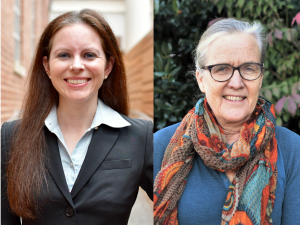
The Humana Foundation awarded Drs. Lindsey Haynes-Maslow, PhD, MHA, and Alice Ammerman, DrPH, MPH, a $250,000 health equity research grant. This grant will support a meal delivery program for low-income senior residents that focuses on social connection and mental health.
Individuals aged 65 and older (“seniors”), particularly those from lower-income communities and who identify as Black, Indigenous, and people of color (BIPOC), are more often impacted by diet-related diseases due to limited access to healthy food compared to younger and White populations. These diet-related diseases include hypertension, heart disease, stroke, and type 2 diabetes. Food insecurity exacerbates these health issues; limited access to healthy food and worsening disease-related symptoms can lead to increases in hospital readmissions and use of emergency services.
In North Carolina, programs like the Healthy Opportunities Pilot (HOP) aim to tackle food insecurity among seniors through initiatives like home-delivered healthy meals (HDHM). However, many HDHM programs lack cultural adaptation, which can impact seniors’ quality of life. Additionally, seniors face heightened social isolation through hearing loss, living alone, and lack of family and friends, impacting mental health and exacerbating physical health issues. To address these challenges, there’s a need for rigorously testing combined interventions like culturally tailored HDHM with structured social interaction to improve mental health outcomes and food security, particularly for vulnerable low-income and BIPOC seniors.
“There is increasing concern about the health effects of loneliness and isolation as well as food insecurity,” said Ammerman. “This project will tackle both and hopefully improve quality of life for seniors.”
This study will test an innovative intervention that combines culturally tailored HDHM with structured intergenerational social interaction, addressing gaps in existing meal delivery programs. This program will provide more substantial contact time, offering volunteer opportunities for students in health-related fields and addressing mental health among seniors. Additionally, this study will use frozen meals called Good Bowls. These meals are based on the Mediterranean Diet adapted for U.S. Southeastern taste preferences (Med-South Lifestyle Program) and are locally produced, sourcing ingredients from local BIPOC farmers, contributing to the local economy.
“Food is an integral part of society,” said Haynes-Maslow. “It is one of the most basic human needs we require to physically thrive, but it also fulfills our social needs. Food brings people together. It is a uniter and a conversation starter. This grant is an opportunity to examine how we can nourish socially isolated seniors’ physical and mental health.”
By respecting seniors’ preferences and heritage, we aim to improve meal consumption rates and overall well-being. Through supporting food security and mental health, this study aims to reduce hospital readmissions and emergency service utilization among seniors. Ultimately, the project’s team hopes their work may inform and adapt existing programs to better serve low-income and BIPOC seniors, potentially enhancing their effectiveness through added social connectedness components.
Dr. Haynes-Maslow, PhD, MHA is an associate professor at UNC Gillings School of Global Public Health and a research fellow at the UNC Center for Health Promotion and Disease Prevention (HPDP). She specializes in policies promoting healthy behaviors in underserved communities. With extensive experience in public health and nutrition, she has worked across various sectors, including academia, non-profits, and government agencies, focusing on chronic disease prevention for low-income, rural, and minority groups.
Dr. Alice Ammerman, DrPH, MPH, is the director of HPDP and is the Mildred Kaufman Distinguished Professor in the department of nutrition in the UNC Gillings School for Global Public Health. Her research experience includes extensive cultural adaptation of nutrition and physical activity intervention materials and interventions at all levels of the socio-ecologic model.
